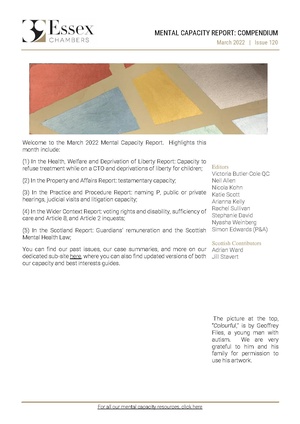Information for "Lancashire and South Cumbria NHS Foundation Trust v Q (2022) EWCOP 6"
Basic information
| Display title | Lancashire and South Cumbria NHS Foundation Trust v Q [2022] EWCOP 6 |
| Default sort key | Lancashire and South Cumbria NHS Foundation Trust v Q (2022) EWCOP 6 |
| Page length (in bytes) | 3,287 |
| Page ID | 14144 |
| Page content language | en - English |
| Page content model | wikitext |
| Indexing by robots | Allowed |
| Number of redirects to this page | 0 |
| Counted as a content page | Yes |
| Page image |  |
Page protection
| Edit | Allow only users with "editing" permission (infinite) |
| Move | Allow only users with "editing" permission (infinite) |
Edit history
| Page creator | Jonathan (talk | contribs) |
| Date of page creation | 23:14, 3 March 2022 |
| Latest editor | Jonathan (talk | contribs) |
| Date of latest edit | 21:36, 18 January 2023 |
| Total number of edits | 4 |
| Total number of distinct authors | 1 |
| Recent number of edits (within past 90 days) | 0 |
| Recent number of distinct authors | 0 |
Page properties
SEO properties
Description | Content |
Article description: (description)This attribute controls the content of the description and og:description elements. | (1) The court-appointed expert had wrongly treated Mostyn J's decision in An NHS Trust v P (2021) EWCOP 27 (that it is virtually impossible and would be completely illogical to say that someone has litigation capacity despite lacking subject matter capacity in medical treatment cases) as meaning the two tests were synonymous, and had wrongly confused the likely unwise instructions with lack of capacity to instruct a legal adviser: Q had capacity to litigate. (2) The judge also disagreed with the expert on capacity in relation to potassium treatment for hypokalaemia (a consequence of bulimia) and found it difficult to resist the conclusion that the independent expert's instinctive professional desire to save Q's life had allowed the "tail of welfare to wag the dog of capacity" (for example, the expert's opinion was that Q attributed little value to her own life and saw little of value in her future, but this did not necessarily mean that her ability to weigh life and death medical decisions in the balance was impaired; instead, it might represent a finely calibrated utilitarian calculation). Q had capacity despite her decisions being unwise and most likely to hasten her death. (3) For essentially the same reasons, she had had capacity when she made an advance decision to refuse treatment. |